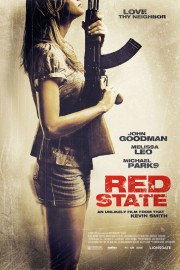Red State
I’ve read words both good, and bad, about Kevin Smith’s most provocative, and controversial film, since 1999’s “Dogma.” This film also deals with contemporary religious thought and fundamentalism. That doesn’t mean it’s as successful as that darkly comic classic, but it’s not the failure I’ve heard people liken it to as well (although the review by Hitfix’s Drew McWeeney that I’ve read brings up excellent points on how Smith gives his subjects more power than they deserve).
For those who are unaware, “Red State” is Smith’s horror-minded satire of Kansas’s Westboro Church and Fred Phelps, their homosexual-hating “spiritual leader.” Phelps and his family are the ones who go around the country, protesting the funerals of soldiers and others with signs reading, “God Hates Fags” and “God Bless IEDs.” Their beliefs are a sick and perverted distortion of the message of Christ and God, and they don’t deserve any more of my time and thought to know that they’re a group of hate that does not represent the beliefs of the majority of Christians.
In “Red State,” Smith takes the next step past Westboro’s “peaceful” protests of intolerance (if you can call them “peaceful”) to show how Abin Cooper, the demigod leader of the film’s Five Points Trinity Church, and his family of followers act violently on the hate they preach. As we learn after they lure three teenagers with a promise of group sex with an older woman, the Five Points Church is behind a rash of homosexual murders in the area. They are drugged by the woman who placed the ad (who turns out to be one of Cooper’s daughters, played by Oscar winner Melissa Leo), and bound and gagged within Cooper’s church, and witness first hand the evil the reverend preaches.
The film goes from religious-minded horror film to a broader level of satire when shots are fired, and an ATF agent played by John Goodman gets involved with what becomes a hostage situation, and a murkier situation politically; parallels to the Waco compound standoff in the ’90s are unmistakable. When the shift happens, Smith’s focus as a writer wavers, leading to an over-long shootout and a finale that feels like an “out of left field” cop out from the points he original seems to want to make. That being said, however, the film remains a riveting change-of-pace by the filmmaker, namely because of the powerful performance by Michael Parks as Cooper. Yes, he’s basically a characature of Phelps, but Parks gives the character a seductive allure in voice and physical energy that makes the words coming out of his mouth, however hateful, disturbingly reasonable. It’s a great performance in what ends up merely a good movie, which feels like it had more to say before it resorted to oversimplifying its message, something Smith winds up having in common with his initial targets.










